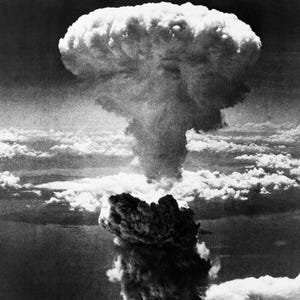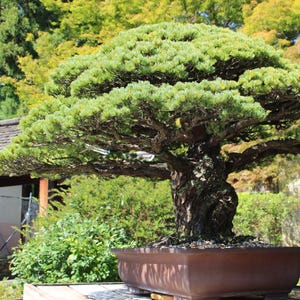Dignitaries joined more than 40,000 people at a ceremony on Thursday
at Hiroshima's Peace Memorial Park, as Japan marked the 70th
anniversary of the atomic bombing of Hiroshima. (Aug. 6)
AP
Tens of thousands of people stood for a minute of silence at a ceremony at 8:15 a.m. in Hiroshima's peace park near the epicenter of the 1945 attack, marking the moment of the blast. Dozens of doves were released as a symbol of peace.
Sunao Tsuboi was on his way to class at Hiroshima Technical School on Aug. 6, 1945, when the atomic bomb — the world’s first — detonated.
Tsuboi remembers a blinding light, followed by a shock wave that hurled him 30 feet and knocked him unconscious. When he awoke, he was covered in burns and could barely walk. All around him was death, destruction and unimaginable horror.
“Houses gone. Bodies everywhere — no arms, no legs, everyone just dead. You look and you ask, ‘Were these really human beings?’ ” Tsuboi, 91, recalled in a recent interview.
“The survivors are getting old and are disappearing, and there are fewer people to tell their stories. So we need to train people to pass along these stories and knowledge so that it doesn’t disappear,” said Ayami Shibata, a Hiroshima city official.
An estimated 140,000 people died from the Hiroshima bombing, and even more were killed three days later in the attack on Nagasaki, on Aug. 9. Tens of thousands of others were injured or suffered deep emotional damage.
Time
has not eased the burden. Decades after the bombings, survivors can be
diagnosed with cancer and others illnesses linked to radiation.
The U.S. dropped the bombs to avoid what would have been a bloody ground assault on the Japanese mainland, following the fierce battle for Japan's southernmost Okinawan islands, which took 12,520 American lives and an estimated 200,000 Japanese, about half civilians.
Hiroshima Mayor Kazumi Matsui called nuclear weapons "the absolute evil and ultimate inhumanity" that must be abolished, and criticized nuclear powers for keeping them as threats to achieve their national interests. He said the world still bristles with more than 15,000 nuclear weapons.U.S. Ambassador Caroline Kennedy and representatives from more than 100 countries, including Britain, France and Russia, attended the ceremony.
Matsui renewed an invitation to world leaders to visit Hiroshima and Nagasaki to see the scars themselves when they attend the Group of Seven summit of top industrialized democracies in Japan next year.
"President Obama and other policymakers, please come to the A-bombed cities, hear the hibakusha (surviving victims) with your own ears, and encounter the reality of the atomic bombings," he said.
"Surely, you will be impelled to start discussing a legal framework, including a nuclear weapons convention."
Contributing: Associated Press
Obama issues challenge on climate change with power plant rule
WASHINGTON
|
The plan, which also mandates a shift to renewable energy from coal-fired electricity, is meant to put the United States in a strong position at international talks in Paris later this year on reaching a deal to curb global warming.
Obama is enacting the plan by executive order, bypassing Congress, which rejected legislative attempts to reduce pollution from carbon dioxide, a common greenhouse gas blamed by scientists for heating the earth.
The regulations face certain legal challenges from states and industries, and their long-term fate depends on their ability to withstand such challenges.
The Clean Power Plan is intended to be a key part of the president's legacy on global warming, which he pledged to fight as a candidate for the White House in 2008.
"We're the first generation to feel the impact of climate change. We're the last generation that can do something about it," Obama told a sympathetic audience at the White House.
"We only get one home. We only get one planet. There's no plan B."
His announcement drew immediate condemnation from Republicans.
Senate Majority Leader Mitch McConnell said the new rules would shutter power plants and drive up electricity costs.
"I will do everything I can to stop it," he said.
The Republican Speaker of the House of Representatives, John Boehner, called the plan an "energy tax" that the administration wanted to issue during a slow recovery from recession.
"I believe this final plan is an expensive, arrogant insult to Americans who are struggling to make ends meet," he said.
Obama rejected criticism that his plan would increase energy bills for Americans, hurt the poor, and cost jobs.
"This is the right thing to do," he said.
(Additional reporting by Julia Edwards; Editing by Frances Kerry)
DESIDERATA: When I Heard OBam via CNN news, this line hit me in the face:(
"We're the first
generation to feel the impact of climate change. We're the last
generation that can do something about it," Obama told a sympathetic
audience at the White House.
AND from EVENTFUL1, the lesson to learn is that if we were to accept OBAMA's describing "CLIMATE CHANGE" as the greatest threat, THE NEXT GREATEST THREAT FACING MANKIND would be when the first NUCLEAR BOMBS ARE RELEASED in modern warfare, which may happen also during the present generation's lifespan.
IN fact, I would beg to slightly disagree with the American President in that the TWO THREATS STATED above should be reversed in the order of IMMINENT THREAT & SEVERITY, and I would lose less sleep over CLimate CHange. THE threat to the survival of homo sapiens comes from the NUCLEAR ARSENAL BUILDUP, more so from MOTher's NATure being abused showing again the STUPIDITY of mankind, of which ALbert EINstein-- my sole idol as the greatest thinker of our planet called EArth-- was very sure of.
FRom brainyquote.com:~~~
FRom brainyquote.com:~~~
"Only two things are infinite, the universe and human stupidity, and I'm not sure about the former."



No comments:
Post a Comment